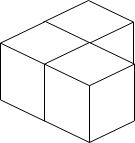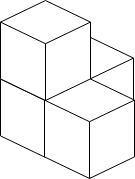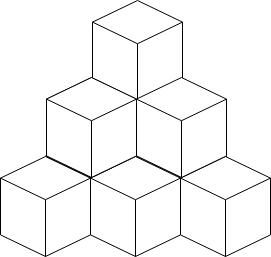放置盒子
难度:
标签:
题目描述
You have a cubic storeroom where the width, length, and height of the room are all equal to n units. You are asked to place n boxes in this room where each box is a cube of unit side length. There are however some rules to placing the boxes:
- You can place the boxes anywhere on the floor.
- If box
xis placed on top of the boxy, then each side of the four vertical sides of the boxymust either be adjacent to another box or to a wall.
Given an integer n, return the minimum possible number of boxes touching the floor.
Example 1:

Input: n = 3 Output: 3 Explanation: The figure above is for the placement of the three boxes. These boxes are placed in the corner of the room, where the corner is on the left side.
Example 2:

Input: n = 4 Output: 3 Explanation: The figure above is for the placement of the four boxes. These boxes are placed in the corner of the room, where the corner is on the left side.
Example 3:

Input: n = 10 Output: 6 Explanation: The figure above is for the placement of the ten boxes. These boxes are placed in the corner of the room, where the corner is on the back side.
Constraints:
1 <= n <= 109
代码结果
运行时间: 28 ms, 内存: 16.0 MB
/*
* 题目思路:
* 1. 我们需要在一个n x n x n的立方体房间中放置n个盒子。
* 2. 由于盒子的放置规则是下层的盒子必须被其他盒子或墙壁包围,我们可以尽量将盒子放在房间的角落。
* 3. 对于一个给定的n,求接触地面的盒子的最少数量,我们可以发现,如果n为完全立方数,则可以形成一个完美的立方体,地面接触盒子的数量最少。
* 4. 如果n不是完全立方数,我们需要计算最大的完整立方体,并计算余下的盒子数量,继续递归或线性计算。
*/
import java.util.stream.IntStream;
public class MinGroundContactBoxes {
public int minBoxes(int n) {
int k = (int) Math.cbrt(n);
int base = k * k * k;
int remainder = n - base;
if (remainder == 0) {
return k * k;
}
return IntStream.of(minBoxes(remainder), k * k).sum();
}
public static void main(String[] args) {
MinGroundContactBoxes solution = new MinGroundContactBoxes();
System.out.println(solution.minBoxes(3)); // 输出: 3
System.out.println(solution.minBoxes(4)); // 输出: 3
System.out.println(solution.minBoxes(10)); // 输出: 6
}
}解释
方法:
此题目的解题思路基于数学构建。首先,我们需要理解题目中的盒子放置规则和求接触地面的盒子的最少数量。这可以通过构建一个盒子堆,使得每个新增加的层都尽可能多地增加盒子,同时保持堆的稳定。\n\n算法首先尝试构建一个完全的金字塔型堆,每层比上一层多一个盒子,直到不能再构建一个完整层为止(即盒子总数不足以构建下一层)。接着,我们计算已使用盒子的总数和当前金字塔底层的盒子数。如果还有剩余的盒子未被放置,则继续在当前最上层逐个放置盒子,每放一个盒子,接触地面的盒子数加一,直到所有盒子都被放置完毕。
时间复杂度:
O(sqrt(n))
空间复杂度:
O(1)
代码细节讲解
🦆
在题解中,为什么先构建一个金字塔形的盒子堆,而不是其他形状?这样做的优势在哪里?
▷🦆
题解中提到,每层比上一层多一个盒子直到不能再构建一个完整层,这种策略是如何确保最小化接触地面的盒子数的?
▷🦆
如果n的值非常大,例如n=100000,构建金字塔的策略是否还是有效,或者需要考虑其他更优的方法?
▷